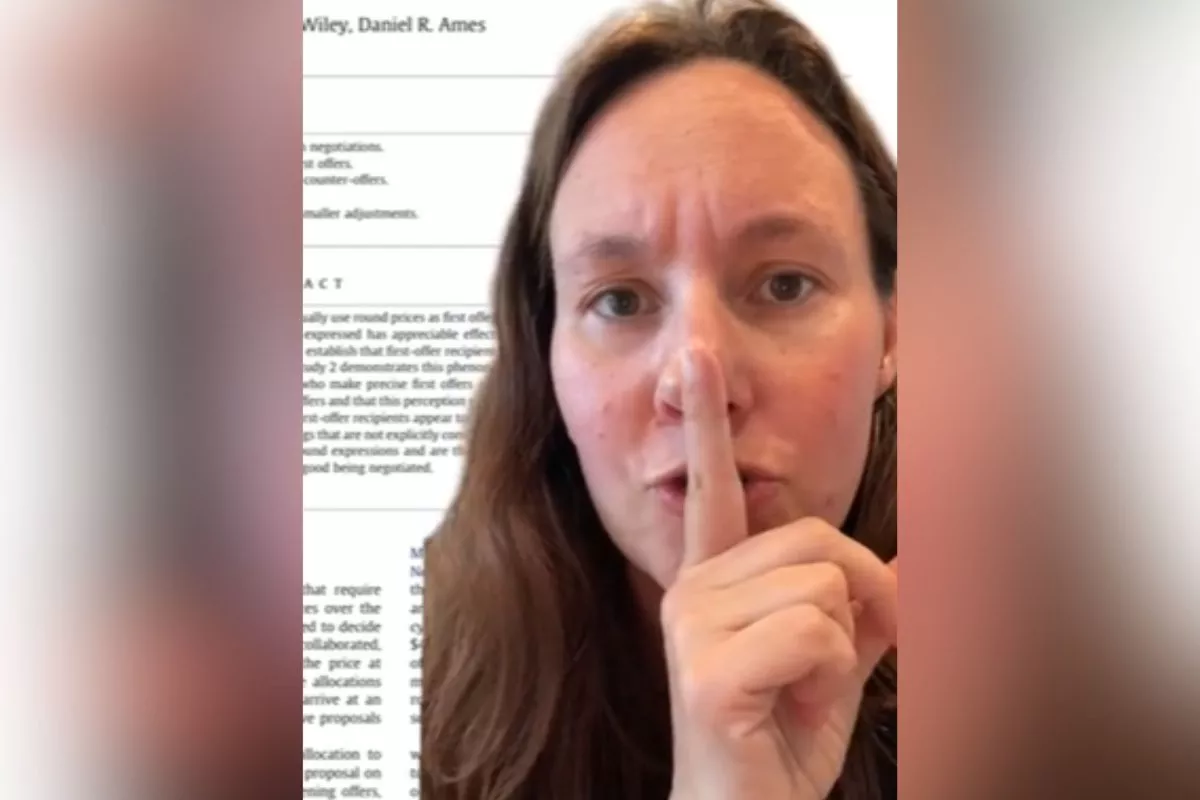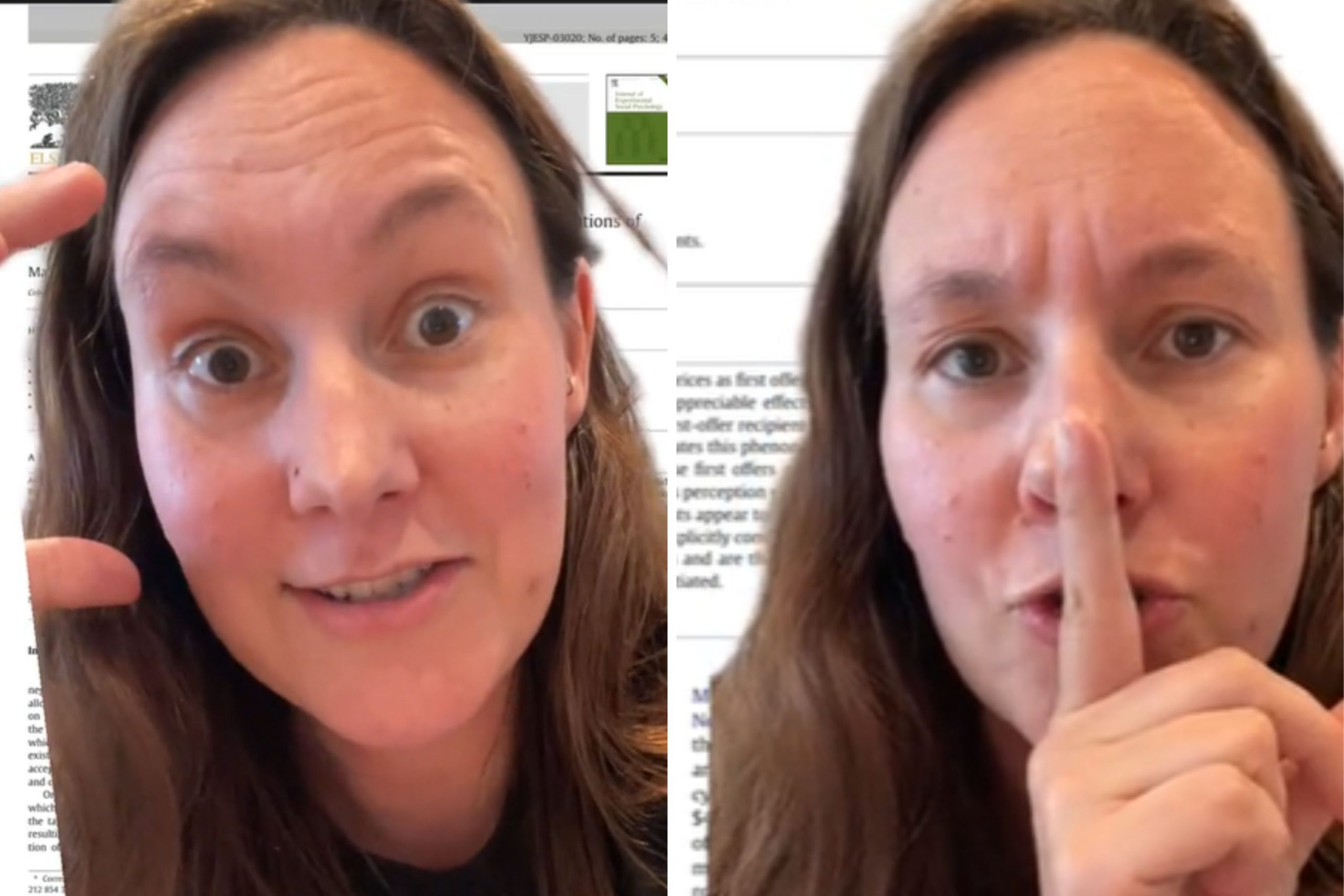A woman has gone viral for sharing a scientifically backed trick to make more money. Internet users agree it has worked on them in the past—even though they didn’t know it at the time.
Author Elspeth Kirkman, 39, stumbled upon the study in her research on human behavior and decision-making and excitedly shared it with followers on her TikTok account @karminker.
Read more: How to Make Money Online
Speaking to Newsweek, the Decisionscape author said that while it’s hard to tell what will do well on TikTok, this subject was a winner as “it’s surprising but intuitive once you think about it” and a “practical tip people can use.”
Elspeth Kirkman stumbled upon a study about using precise numbers in her research. She’s certain she’s fallen for it in the past without even realizing.
TikTok @karminker
In a video titled “How to Negotiate,” Kirkman said what she learned should “definitely be taught in school”: that you should always use a precise value rather than a round number when selling or buying a product.
Using the example of selling a secondhand bicycle online for which you want £100 ($127.85), she said, “You should price it at £97.80 or £103.45.”
Read more: Compare the Best Money-Making Apps
“The reason for that is that the person on the other side of the negotiation is going to look at that and think, OK, that’s precise. They must have some really specific information on how much this thing is worth,” she said.
It acts to make you appear more “credible,” she said, and when making a counteroffer, the buyer will likely settle on a figure “close to what you want.”
Kirkman, who lives in Devon, England, joked that you should ask your landlord for £48.50 off your rent or your employer for a pay rise of £398.
One commenter gave an example of how they applied the tip in real life. “This definitely works,” they wrote. “I just bought a house for £195,025 ($249,403.82).”
Another commenter said that the tip also works for bidding on an item: “Most people will round up their bid, so if your top is £10.03p yours will beat all bids at £10. Used this approach a lot of eBay to win auctions,” they wrote.
A TikTok user said they had sold their house quickly using this system, and another declared they were “on my way to change all the prices of my Vinted items.”
Kirkman’s video, which has over 100,000 views, is based on the 2012 study by Malia F Mason, Alice J Lee, Elizabeth A Wiley, and R Ames, “Precise offers are potent anchors: Conciliatory counteroffers and attributions of knowledge in negotiations.”
Read more: Best Side Hustles
The study argues people are “in the habit of using round prices as first offers,” but prices first offers work better as “more potent anchors” as they are “more informed, prompting smaller adjustments.”
Using multiple studies where some participants were given a round number in a hypothetical negotiation and others a precise number, it was found time and again that “precise first offers act as more potent anchors than round first offers” and that the negotiator received a higher counteroffer in the final settlements.

Plenty of commenters told Kirkman they had used the tip to success. One had bought a home, and another sold theirs using the strategy.
TikTok @karminker
The authors wrote that it implies that negotiators can get “more value in competitive interactions” by using precision in their opening offers, as this leads to “less aggressive counteroffers.”
Study author Mason, a professor at Columbia University, told Newsweek that she was “grateful” to Kirkman and others who “use their platforms to share our lessons.”
“Universities exist not just to educate their students but to create and share knowledge beyond their gates; they are a public good. The ideas and knowledge are not meant to be limited to the select group of students we have the opportunity to work with,” she said.
Expanding on her study, Mason advised that negotiators using her method to “be precise but not so precise that it’s awkward.”
“I think offering $1525 is more sensible than $1525.94,” she said, with the main takeaway being that people should “avoid numbers that end in zeros,” which is what people are “naturally drawn to use.”
Kirkman told Newsweek that even before coming across the research, she was certain she had fallen for it and used it herself without realizing it.
Kirkman warned, however, that she has since learned that some scammers on Vinted and other online marketplaces also use precise values, “so in some settings, it might disadvantage sellers.”
Some commenters had told her that “they would not buy a precise price item because scam accounts price things this way,” so it “could backfire in certain contexts.”
Online marketplaces would not have been anywhere near as common when the study was published. And Mason agrees that in some circumstances, things have changed.
She told Newsweek that since their study was published, they have found that precise numbers “work particularly well when a negotiation is already underway” but not as well when used as list prices, such as in an online advertisement.
Sellers who are precise, such as requesting $495, “might receive better offers than those using round numbers, but they appear to receive fewer offers and more delayed offers than those who use round numbers,” she said.
“If you are selling on an online marketplace and you need to do it quickly, it might make more sense to go with round.”
Overall, Kirkman has seen the method work, as she told Newsweek: “Lots of people shared stories in the comments about how it’s worked for buying property, negotiating a pay rise, or even, when you use a precise time, getting people to show up to appointments on time.
“I assumed it would work for the same reason the experimenters prove—because it makes your proposal seem more informed, so it was nice to find evidence for it!”
Do you have a monetary dilemma? Let us know via life@newsweek.com. We can ask experts for advice, and your story could be featured on Newsweek.
Uncommon Knowledge
Newsweek is committed to challenging conventional wisdom and finding connections in the search for common ground.
Newsweek is committed to challenging conventional wisdom and finding connections in the search for common ground.





